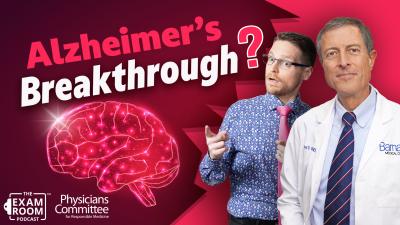Signs of Hope in Alzheimer's Disease Research

As one of the top ten causes of death in the United States, Alzheimer’s disease is the only major chronic disease growing at an epidemic rate with no disease-modifying treatments available.
As one of the top ten causes of death in the United States, Alzheimer’s disease is the only major chronic disease growing at an epidemic rate with no disease-modifying treatments available. The disease is of such great concern that the U.S. government passed the National Alzheimer’s Project Act (NAPA) in 2011 with the goal of finding a way to prevent and effectively treat Alzheimer's disease by 2025 while also optimizing care support services and public awareness. This law led to the creation of an advisory council that meets regularly to evaluate and update recommendations for the National Plan to achieve the goals of NAPA. In 2014, the government also passed the Alzheimer's Accountability Act to require the National Institute of Health (NIH) to propose annually a Bypass Budget which determines the amount of additional funds needed to reach the research goals of the National Plan. Congress and the President decide on an annual basis whether to approve this Bypass Budget. Once approved, the NIH is the decision-maker for where these additional funds are allocated in Alzheimer’s research.
As detailed in our previous blog, Alzheimer’s research has not made any significant breakthroughs in treatments likely due to its focus on flawed animal models and a pathological observation that may not be a key underlying factor driving the most common form of the disease. The Physicians Committee presented these and other flaws with Alzheimer’s research at the Advisory Council meeting in January 2017. We recommended that the Council direct research toward human-relevant models and modifying lifestyle factors driving the most common form of the disease. In the April meeting, the research subcommittee of the Advisory Council made two recommendations in line with our input:
- Identify and evaluate (non-drug) care strategies that reduce disease burden and delay disease progression and evaluate their costs and downstream effects.
- Convene a conference of key stakeholders to identify a meaningful pathway or pipeline for developing and testing nonpharmacological treatments, and scaling up and implementing effective approaches.
A National Research Summit on Care, Services and Supports for Persons with Dementia and their Caregivers is scheduled to occur in October 2017, and the National Institute of Aging (NIA) plans to integrate the recommendations following the summit into their future research funding planning.
In March 2017, Physicians Committee sent a commentary to the NIA to request an increase in allocation of funds in the Bypass Budget for epidemiological and clinical studies as well as human-based research approaches. Compared to the fiscal year 2018 Bypass Budget, the recently released Bypass Budget for fiscal year 2019 reflected an increase funding allocation in the areas consistent with our recommendations: 4 percent in translational research and clinical interventions, 2 percent in epidemiology, and 1 percent in research resources.
These shifts in research support are encouraging in the development of disease-modifying interventions through human-based approaches. These changes follow on the heels of promising clinical studies including a recent lifestyle intervention clinical trial utilizing diet, exercise, and cognitive training in 1,260 people in Finland demonstrating significant improvements in cognitive functions relative to controls. Scientific American magazine featured the study on the front cover of their April 2017 issue and called it “A Rare Success Against Alzheimer’s.” At the Alzheimer’s Association International Conference in July 2017, there were presentations announcing plans to repeat the study at many sites worldwide. During this meeting, the Alzheimer’s Association even announced its support of this trial in the United States by committing 20 million dollars to it. With more funding going into these types of clinical trials, perhaps Alzheimer’s research may finally move toward producing effective disease-modifying interventions.







